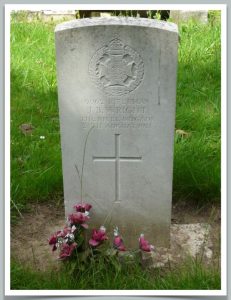3rd Battalion, Rifle Brigade (The Prince Consort’s Own)

Rifleman Jesse Wright was a pre-war professional six days before the final date for consideration as a casualty of that war.
Jesse Benjamin Wright was born in 1882 in Cirencester. His parents were Alfred Benjamin Wright (1856-1930), a builder’s foreman and his wife Elizabeth Emily (née Mortimer: 1850-1917).
In 1901 the couple lived at 175 Gloucester Street, Cirencester and the census shows them to have had five children and two step-children.
An Army Pension Record has survived for Jesse and this tells us he enlisted in the Army on 20 November 1899, undertaking to serve seven years ‘with the Colours’ and five in the Reserve.
He gave his age as 18 years and one month and his occupation as a labourer. His existing service with the former Gloucestershire Militia was noted.
He joined the Gloucestershire Regiment and was given the number 5717: on 15 February 1900 he was posted to the 2nd Battalion.
His first overseas posting was to St Helena in May 1900, where he spent time guarding Boer prisoners.
He remained there until February 1902, when he was transferred to South Africa, staying there until November of that year.
During his time in South Africa he was subjected to a Court Martial, on 24 April 1902. He was charged and found guilty of attempting to desert, whilst on active service. His punishment was two years’ imprisonment with hard labour but the Commander in Chief mitigated this to fifty-six days.
A posting to India followed in November 1902 and whilst there he transferred to the Rifle Brigade and became a Rifleman (equivalent of a Private). His stay in India lasted exactly two years and this was followed by service in Aden until January 1906.
He then returned to the UK, after serving eight years ‘with the Colours’ and entered the Reserve on 19 November 1907.
On 4 September 1907 he married Catherine (Kate) Sellick (1884-1972) at East Stonehouse, Devon and the couple went on to have seven children, born between the years 1908 and 1921 (inclusive), all at Cirencester.
The 1911 Census records the family, then consisting of Jesse, Kate and two children, living at 45 Castle Street, Cirencester. Jesse, aged 28, was a coal merchant’s labourer.
In July 1911 Jesse re-engaged with the Army and served in the UK or Ireland up until the outbreak of the Great War.
He was now serving with the 3rd Battalion of the Rifle Brigade, who, at the start of the war, were based at Cork in Ireland.
The battalion quickly returned to England and in mid-August were located in the Cambridge & Newmarket area.
On 12 September 1914 the battalion landed at St Nazaire in France as part of 3 Brigade, 6 Division.
It appears that Jesse suffered a gunshot wound on or about 13 October 1914, on Ballieul Ridge, in an action where sixty-five men were wounded.
His Army Pension Record notes that he suffered a gunshot wound to the leg recorded as ‘slight’ however, the assessment of the wound was probably understated, as he was never to return abroad and front line fighting.
He returned to England on 23 October 1914 and was placed on the strength of the Rifle Brigade Depot.
Almost certainly he spent the next few months receiving treatment for his injury, before being discharged from the Army on 5 May 1915, as ‘no longer physically fit for war service’.
In all he had served 15 years and 259 days in the Army.
It is not known how his life progressed following his discharge. He died on 25 August 1921, aged 38.
According to a recently released Pension Record Card death his was due to ‘spastic paraplegia-aortic disease’. The implication is that the gunshot wounded suffered back in October 1914 had left him significantly disabled and he had also developed a heart condition.
Rifleman Jesse Benjamin Wright is buried in the Cirencester (Chesterton) Cemetery, where a standard CWGC headstone marks his grave.
Research by Graham Adams 9 May 2021
